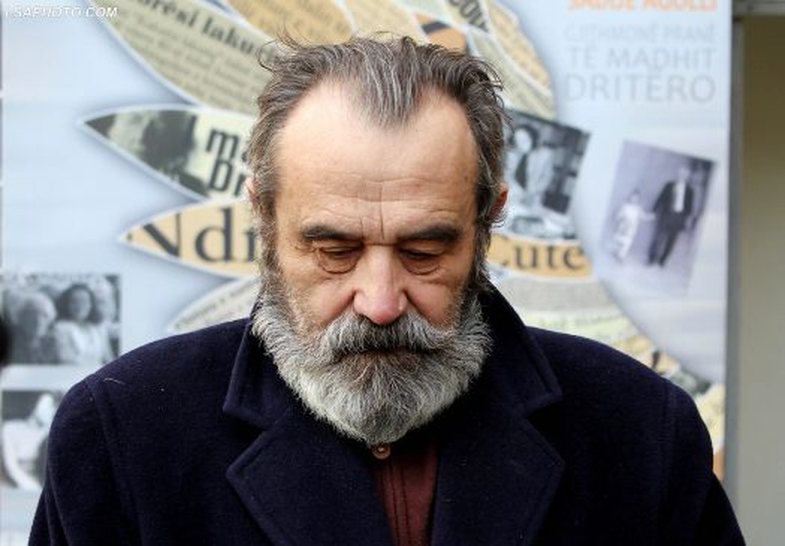
Note: The following article was written by the late poet Frederik Rreshpja for Moikom Zeqon, the well-known erudite who passed away today as a result of a serious illness. Rreshpja's article was first published in the newspaper "Albania" in August 2001 (via KultPlus ).
All the articles written in periodicals about Moikom Zeqon, describe his books as very strange and sometimes incomprehensible. Here I have in mind especially serious authors, such as Alfred Uçi, Skënder Drini, etc. In fact, there is nothing incomprehensible or strange here if we remember that Zeqo's books are treatises, a genre of this, of classical and modern times, which is treated by both Lucian and Erasmus of Rotterdam, and by Blez Paskali. , Descartes, Einstein also from Heidenberg. Especially the French Enlightenment, such as Diderot, Voltaire, Montesquieu, Furje, Simoni, etc., have written treaties of extraordinary importance to world culture.
Zeqo himself says nothing about this.
He does not name books of any gender and never.
Zeqo's work, one of the most astonishing and perhaps most special productions of Albanian literature, is very extensive.
I will mention some recent major books such as "Medusa", "Temple of the Moon", "Albanian Purgatory", "Onufri", "The Medusa in Love Wears Sunglasses", "Between Laokont and Christ, Onufri II", "Thus spoke Mona Lisa ?,? Broken Glasses of Medusa ?,? The Third Eye - Naim Frashëri and Bektashism ?,? Princes of Mysticism ?,? Nostrodami on June 3 ?,? Tercins of the Death of the Japanese Dante ?,? Zodiac ?, "Albania's Extraterrestrials", are some of these books in the compilation of which, Zeqo has used a skillful combination of elements of narration, monograph, poetry, history, philosophy, theology, archeology, etc., etc.
He makes this compilation, I think, to exhaust the whole topic, so here we have an author, poet, historian, esthete, archaeologist, etc., etc.
We refer to the book we are holding in our hands, "Broken Glasses of Medusa", we easily find that at first this is a poetic book, but intertwined with several books, which could be singled out, it is understood that this cannot be done. it would not be a wise thing to do.
In one of his writings, Alfred Uçi, says that we are used to reading books of the correct gender, defined by strict rules as a separate genre e.g. novel, poetry, monograph, study, etc., etc.
Of course, this was an accelerated opinion of Mr. Uçi, as one of the skilled people of Albanian letters, because he must have read Lukian, Jean Paul Sartre, D'Anuncio, Marquez, Borges, Karpentier, Skorca, Alenden, Montenjin, Eliot, etc.
I am saying that from the beginning, however, there is something extraordinary and really strange about Moikom Zeqo.
And this has nothing to do with technical problems with stylistic definitions, etc., but with the extraordinary and versatile culture, the great talent and the truly amazing ability to work tirelessly. That's right. Here we really have a wonder.
Because we have no reason to be surprised by modern and postmodern forms, chosen by a well-known author in Albanian culture.
It is true that in a literary or scientific competition Moikom's books do not know how they would be classified, but perhaps they could be generously called monographs, or simply poetic works.
Zeqo does not pay much attention to the rules that determine the literary genres, while it is there that he sets the times, putting e.g. Narcissus in front of Adam:
"In a world with terribly different landscapes, with as many dissimilar beings and opposite details and exceptional directions in this chaotic, volatile and vulgar confusion, when the deities of the Great Nothing had not yet been created, there was a man who could not. ' it is known, why they called him (by whom?) Narciz. Thousands of years later, another false reflection would be created, so vain and miserable by the clay (pre-sculpture), Adam ?.
There are many such cases, in this case we are examining the fact that Zeqo seems to be making a mess of time, only for a poetic or philosophical fiction.
But it seems to me that this is not the case, simply because he knows history best, and this is well known, as he is one of our most prominent historians.
The case we quoted above explains that the opinion of scientists is that Greek mythology is older than that of the Jews.
By not clarifying these things, it turns out that Zeqo puts us in front of endless paradoxes.
We all know the fact that there are prose poems and there is poetic prose. So, does Zeqo return to prose when he was tired as a poet?
No. Or did he run away from prose for a poetic fiction?
No. In fact he fights with a lot of weapons to get the castle he wants. He uses everything: draws with flamethrowers and oil, writes tercina and haiku, ode, esse, dialogue, story; polemics, philosophizes, researches, etc., etc.
Moikom Zeqo is known as a poet, prose writer, journalist, archaeologist, historian, politician, etc.
And it seems to me that he found it reasonable to appear in exactly one work like that, in many plans at once.
In today's postmodernist literature this is something common, but it requires a great personality.
So this is something modern, but like many things in this world, it has its origins in antiquity.
We said above that as a rule such works are called treaties, but we must be aware that for Moikom Zeqon this is a bit to say, because in fact with the recognition that I have all the letters in the world, I do not find one such broad and successful courage.
It is true that Lomonosov wrote poems in the margin of scientific articles, but did not publish them together.
Bonaparte drafted laws on military maps, and Balzac even wrote debts in the chapters of novels, Da Vinci sketched helicopters over the galaxy.
The great Migjen in "Free Verses" has published poetry and stories together.
Hemingway does it differently: he collects two stories and calls them novels. Lucian writes about the natural sciences in verse.
Gogoli writes the novel "Dead Souls" and calls it a poem, while Pushkin makes the poem "Eugen Onjegin" and calls it a novel.
Japanese painters write their poems on watercolors and all of them have made masterpieces.
So Zeqo's works are both literary and scientific, and within this definition, however, art works can be called a priority, as it is easy and clear how the artist Zeqo with his works is more visible.
But he is an artist-scientist and we have not had one, except maybe Naim Frashëri to some extent. Zeqo's work cannot be confused with the work of Akimov, Hajerdall, Prust, Sartre, because the composition of his works is reminiscent of emulsion in chemistry.
With perception, there we clearly distinguish poetic, theological, historical layers, etc ..
To appear in so many plans, as it were, dressed both in autumn and spring, even in many seasons, we must admit that it is a miracle.
Let's talk about Moikom Zeqo's poetry.
Since the 70's he begins to write differently.
This has passed without being well understood, without noise, and yet Moikom Zeqo has been praised by critics and readers as one of the best Albanian poets.
His first feature is that Zeqo has a crazy fantasy and this crazy, rich and unparalleled fantasy except perhaps some Ginsberg or Janis Ricos, sometimes turns into a carousel and thus the uneducated reader with dizzying poetic speed comes tired . In addition, it damages the poetry.
And here's why: on the run, Zeqo looks like a sculptor, doing the work of 100 sculptors running from one torso to another, throwing a clay spatula here and there, tearing something up, making a mess and definitely leaving something half in this strange atelier.
Thus many imaginations, figures, ideas and images remain half-baked.
example:
Romeo is the King of Zzi
of Juliet the White Queen
since falling in love
they lose the meaning of chess
which is only division and hatred,
divorce
and not marriage.
These figures had to be taken further, the imaginary edifice had to be completed. This is where the general idea that you can extract 100 poems from a poem by Zeqo was born.
True this shows tremendous wealth, but on the other hand it shows a carelessness, as the reader asks: why weren?t these 100 poems made?
And it is astonishing, truly astonishing and inexplicable, how such an extraordinary worker is lazy to stop with a poem, too seriously to de-escalate it and take it further.
Where is the character's character
who die in books? How crazy is Shakespeare?
It has left an entire civilization independent!
Who will pay for my vain funeral?
Please borrow De Rada
from royalties, which you never pay!
Flowering peach branches
are the intoxicants within my old whore
The magnetic eye of the compass is of Polifem Thought.
There is such a density of images here that I, as a professional, have to go back to derivatives once again to understand something.
Of course, this is not the time to make such treatments, as this will be a study in itself.
However, it must be said that Zeqo, as a talented poet, must stop at many poems, move the figures further and become more constructive.
I will now give as an example a wonderful poem, without much detail and without much fuss.
The graphic presentation of this poem is unacceptable to me, but the poetry itself is truly a masterpiece.
More or less the poem is this: A painter takes a paper and draws some birds, some time passes and the birds run away and fly away, as the paper cannot become the cage of free birds.
I can mention many such things as: "Rebellion", "January 9, 1996", "Crystal Death", "House", "Girls' Faces", etc.
Since the book "City of Phoenix" in the 70's, Zeqo comes up with a new poem, where there are clearly surpasses before which Pindar seems a simple flyer. A metaphysical meaning of the universe stands out, reminiscent of some Rembo.
There are cosmic dimensions in space and time and unimaginable imaginations in Albanian literature until then, but the world has known them in Rembo, Blejku, Valeria, Ginsberg and why not before in Confucius and Du Fu.
So at that time I had written in the press that Zeqo was the most fantasy poet to the point of fatigue, and this has led to this before, however this remains a new poetry in Albanian literature, although known from around the world although in this plan there is something creative.
Here we will encounter civilizations, ideas, definitions, transitions, space, time, endless fantasy, a tiring run from one picture to another from one idea to another, from one corner of the cosmos to another.
In one place, Moikomi marvels at Homer's words: "Ships as fast as thought."
This has made it very difficult to write about Zeqon.
Of course it's much harder than writing about that bunch of books that come out every day.
From these books Moikom Zeqon shares a hon.
Overcome this hon and then you will write easily and with pleasure for this author.
But of course this does not require culture, as Zeqo is known as one of the most cultured Albanians of all time.
In an article about Kadare, I said that to enter and understand something from the Louvre, you need culture.
Surprisingly, as stated in popular prose and not captured by anyone, it is the fact that Moikom Zeqo in his entire activity is the first Albanian theologian from Bogdan onwards, but a theologian of his kind, somewhat volterian and I say this because in all his works with all the love for the myths of the East, etc., the socialist idea emerges that this world with all these pains, social injustice and suffering has no way of being the work of a merciful and compassionate deity.
Four religions that are practiced in Albania, but also other religions that have recently entered, without exception have their origin in the Bible, so you can very well say that the God of Albanians is one and is called Jahova (JHVH), Sabat or Allah ( Elijah's Islamized form), but only in one case is it in the Bible also as a direct word. Generally the morality of these religions stems from the Tablets of Moses and they do not have any theological, magical or even divine character, but it is a set of rules to maintain collectivity, social relations.
Zeqo gives this best without blasphemy, without insulting anyone, because he is in love with Christian and mystical mythology, but more as an esthete, as it is easy to understand that Zeqo is a modern atheist accustomed to the concept of God as a "being." supreme ?(Hegel), as a? perfect intellect ?(Einstein).
It is the first time in Albania that a demiurge has been written on philosophical categories, far from the patriarchal concept of Eastern myths.
There are hundreds of religions in the world and their deities are created on the basis of respective cultures, so these deities sound somewhat delayed and can not be compared with today's technical culture, Zeqo loves them more as an esthete and poet, as this definition that i did above, he knows well. Personally, I have no such longing for any cult, but we accept, like Moikomi, that religions are culture, including the dead religions of the Greeks and the Ascetics, etc.
I have the impression that Zeqo has denied communist atheism, which presents the infinite matter in time and space, which contradicts scientific laws (Lavuazje).
In his faith, Zeqo is more of a poet and researcher.
There are some extremely beautiful stories from the world of religion, but you can't tell them religious stories.
Modern philosophy does not accept the concept of God, as given by various religions, and has criticized all myths about deities.
But on the other hand, she does not stop looking for a new concept of "supermeter" (Heidegger), which is apparently premature or perhaps impossible for human reason.
However, Zeqo rightly says, religions have their own beauty, their own morality, so they should be loved and respected.
It seems to me that not only for Greek mythology, but for all religions as a whole, the time has come to look at it simply as mythology or, as the French define it - beautiful legends.
In fact, this is the belief of a democratic atheist.
It is strange how in Albania there are famous intellectuals who believe in horoscopes, magic, the hand of God or amateur cults.
But it happens everywhere. I was shocked when I read in the foreign press that Clinton kept two horoscopes in the White House and consulted with them every morning, in the most serious way.
It is fortunate that Zeqo in all his activity as a man of culture, does not deal with these things as with chiromancy, fortune-telling and other nonsense, as he is at the highest level as a philosopher and poet of theology.
I can't help but write about Karbala.
But I would like to write about the Kaaba Bridge and the Taj Mahal, as I am more popular than my old friend, but also as a theologian I like Zeqo as much as Thomas Aquinas and the mystics of Persia.
Especially interesting is the fact that Zeqo creates by presenting modern ideas on eternity, time, space, the Big Bang, the demiurge; and all of them are presented in poetry in a very modern and brilliant style. The dimensions in Zeqo's work are large and this is known, but I only stopped at a few points.
Of course I can't help but say something about archeology, painting, as Zeqo conceives them together.
One of the peaks of his creativity is the serious study on Onufri, an extraordinary painter, who has made an era not only in Albanian painting, but throughout the Byzantine one.
In a language of a particular style, he makes a scientific analysis of Onufri's activity, but as a reader, I am perhaps more impressed by the figure of this prelate of colors that further enriches our culture.
He makes a multifaceted analysis and has a surprising historical and ethnic documentation available and on this basis the Christian spirit of this painting has been deconstructed, which is a cry that resonates and will resonate for centuries, the way the world is conceived by Onufri's side is said to be the first to emerge from the rigid tradition of Byzantine painting and iconography.
Also of interest are the Albanian elements in Onufri's painting, its color, the famous red, the inner world that emerges with the small vibrations of the paintbrush, the fluctuations between solid theology and a certain Bektashism, as in Onufri's painting , after a detailed analysis, many purely secular elements emerge.
Seen in this prism as Borges, Zeqo connects the eras by hiding the peri. Well, the connection between Onufri and the Bektashis is very clear. It seems strange how Onufri is the first Bektashi.
Yes Zeqo deals with strange things.
This analysis is an endless work and I do not pretend to do full research for reasons of time and place, but I stopped at a few key points that caught my attention.
I completely agree with the writings that Zeqo's books have an internal autonomy and can even be read by opening any page, just like the Bible.
But this is a new, modern and reliable Bible.
Like the great Kadare, Moikom Zeqo is a phenomenon in Albanian literature and not in vain, but he approaches these two major and authoritarian figures.
In one place, Unamuno says that "Cervantes wrote about me centuries ago."
How I wish these two wise men that I value above all in Albanian letters wrote about me, but, I know that a Unamuno will come later.
The Moikom Zeqo phenomenon is the concentration of a high intellectuality, a new stage of Albanian literature and culture.
It is not difficult to dimension it, or rather the hierarchical dimensioning of Zeqo's books is a matter of time and understanding.
No one can say for sure that he has no ability to understand the great books. A sluggish critic gets in our way. We are often so stupid as to refer to newspapers and trust them as pharmaceutical notes of expired drugs.
Being structured in one book, the writer is never closed, but only open in all books.
It is elegant and magical to say that every true writer writes only one book in a lifetime.
This book may have several pages of genius paradoxes and capricious metaphors like Rembo or Whitman.
Let's not forget the extraordinary sketches with the renewal of powers with a permanent emancipation of Migjen.
Who said Homer wrote bold books?
Large essays are characterized not by the numerous written sheets. In Zeqo it could be the opening of a new era.
Traditional writing does not mean that there is no modernity. Modernity is rather an essence of conception and form.
But in the postmodern era, Zeqo with a new mindset creates a new language.
Surprisingly, the infinity of paradoxes also often creates difficulties.
Every paradox is the beginning of philosophy.
The gray Heraclitus knew this, apparently Borges conveyed the literature of paradoxes as the Spanish corridors, where the toreadors encounter bulls.
Zeqo also prefers the spectacle of ideas, but prefers some more secret clashes.
So he likes the mysticism of the Bektashis as a new form of Zarathustraism.
A transcendence of the poetic level since Zeqo in the 70's towards the emancipation of metaphors and thematic elaboration led him to a special transcendence of prose in the 90's. Thus, Zeqo's poetry and prose are the same. We marvel at their unity and think of special things or motives with multiple ambiguities.
As an old friend of Moikom Zeqo, I followed his creativity.
But only at this time his successes are more readable, he brings us new reading codes. It is not only culture that creates Moikomian literary symphony. A nebulous movement, which has to do with his genesis is ubiquitous in his books, as is life itself. The author almost ironizes the absolute formulas, but he looks at moral relativism with scorn, he is not afraid to satirize it. The inner lyricism of the word surprises you, although the poetic carelessness speaks more of a deliberate breaking of the rules, which comes from long experience.
The density of ideas is so great on a sheet of paper that other writers with the same subject could write dozens of pages.
This intellectual love for synthesis is rare and to some extent I can say that this writer is lonely.
So in this way, he seeks to demystify us and his world.
I know that evaluation acts are the most difficult acts.
Balzac is mentioned not only for his magnificent work, which he humbly called "Human Comedy."
He is said to be the only one in France to have discovered the talent hidden by Stendhal's public outcry.
This was not done by Sent Bevi or the prominent French critics and aesthetics.
Balzac's honesty in this case had a historical character. I don?t want to draw any parallels.
Nor do I want to say that this writing is merely the character of a revelation. Zeqo has always been a well-known public figure.
For reasons I cannot understand and therefore do not always want to explain, this man and creator is not properly understood.
Isn't that the case with the wonderful poet Ndre Mjeda? How the hell at all times, Mjeda is "unknown", "incomprehensible"? My writing is definitely an invitation to discussion.
This is how it should be understood. It takes time, care, strain, and obviously a lot of love to write about Zeqo's special books.
Because he deserves this love.
He himself has given and gives love.







